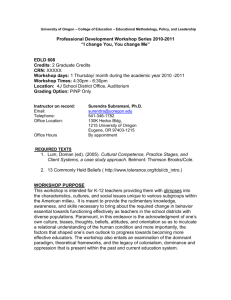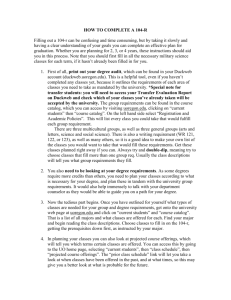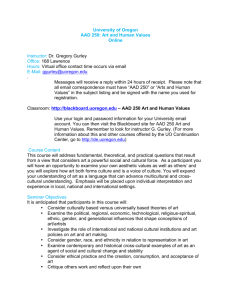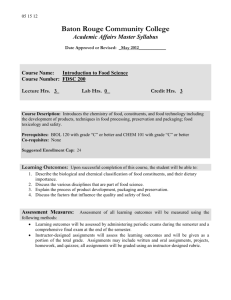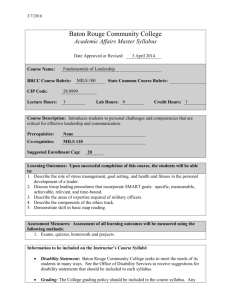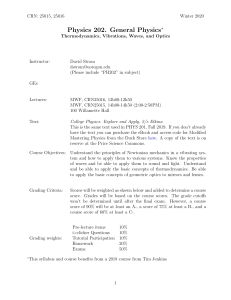COURSE TITLE - College of Education
advertisement
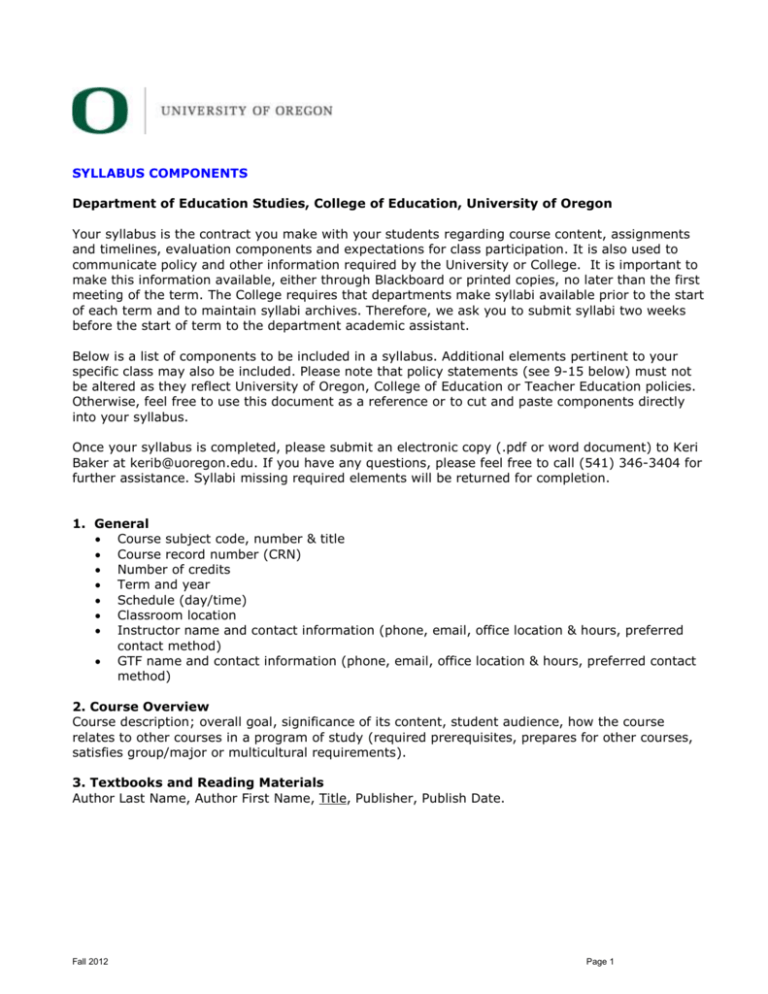
SYLLABUS COMPONENTS Department of Education Studies, College of Education, University of Oregon Your syllabus is the contract you make with your students regarding course content, assignments and timelines, evaluation components and expectations for class participation. It is also used to communicate policy and other information required by the University or College. It is important to make this information available, either through Blackboard or printed copies, no later than the first meeting of the term. The College requires that departments make syllabi available prior to the start of each term and to maintain syllabi archives. Therefore, we ask you to submit syllabi two weeks before the start of term to the department academic assistant. Below is a list of components to be included in a syllabus. Additional elements pertinent to your specific class may also be included. Please note that policy statements (see 9-15 below) must not be altered as they reflect University of Oregon, College of Education or Teacher Education policies. Otherwise, feel free to use this document as a reference or to cut and paste components directly into your syllabus. Once your syllabus is completed, please submit an electronic copy (.pdf or word document) to Keri Baker at kerib@uoregon.edu. If you have any questions, please feel free to call (541) 346-3404 for further assistance. Syllabi missing required elements will be returned for completion. 1. General Course subject code, number & title Course record number (CRN) Number of credits Term and year Schedule (day/time) Classroom location Instructor name and contact information (phone, email, office location & hours, preferred contact method) GTF name and contact information (phone, email, office location & hours, preferred contact method) 2. Course Overview Course description; overall goal, significance of its content, student audience, how the course relates to other courses in a program of study (required prerequisites, prepares for other courses, satisfies group/major or multicultural requirements). 3. Textbooks and Reading Materials Author Last Name, Author First Name, Title, Publisher, Publish Date. Fall 2012 Page 1 4. Weekly Schedule of Topics and Assignments Dates of topics, assignments and exams. Example: SCHEDULE OF INSTRUCTIONAL THEMES BY WEEK Week 1 Theme Readings Assignments due 5. Grading Components and Criteria List of assignments, weight in grading, and how they will be evaluated. 6. Graduate/Undergraduate differentiation (if applicable) If this is offered as a 400/500 level course, include a clear statement of how the requirements/rigor/expectations differ for undergrads and grad students 7. Attendance and Absence Guidelines Expectations for class attendance. 8. Expected Classroom Behavior Expectations for classroom behavior. 9. Diversity It is the policy of the University of Oregon to support and value diversity. To do so requires that we: respect the dignity and essential worth of all individuals. promote a culture of respect throughout the University community. respect the privacy, property, and freedom of others. reject bigotry, discrimination, violence, or intimidation of any kind. practice personal and academic integrity and expect it from others. promote the diversity of opinions, ideas and backgrounds which is the lifeblood of the university. 10. Documented Disability Appropriate accommodations will be provided for students with documented disabilities. If you have a documented disability and require accommodation, arrange to meet with the course instructor within the first two weeks of the term. The documentation of your disability must come in writing from the Disability Services in the Office of Academic Advising and Student Services. Disabilities may include (but are not limited to) neurological impairment, orthopedic impairment, traumatic brain injury, visual impairment, chronic medical conditions, emotional/psychological disabilities, hearing impairment, and learning disabilities. For more information on Disability Services, please see http://ds.uoregon.edu/ 11. Academic Misconduct Policy All students are subject to the regulations stipulated in the UO Student Conduct Code http://studentlife.uoregon.edu/StudentConductandCommunityStandards/StudentConductCode/tabi d/69/Default.aspx. This code represents a compilation of important regulations, policies, and procedures pertaining to student life. It is intended to inform students of their rights and responsibilities during their association with this institution, and to provide general guidance for enforcing those regulations and policies essential to the educational and research missions of the University. Fall 2012 Page 2 12. Conflict Resolution Several options, both informal and formal, are available to resolve conflicts for students who believe they have been subjected to or have witnesses bias, unfairness, or other improper treatment. It is important to exhaust the administrative remedies available to you including discussing the conflict with the specific individual, contacting the Department Head, or within the College of Education you can contact Ron Beghetto, Associate Dean for Academic Affairs, at 346-1534 beghetto@uoregon.edu or Surendra Subramani, Diversity Coordinator, at 346-1782 or surendra@uoregon.edu. Outside the College, you can contact: * UO Bias Response Team: 346-1139 or http://bias.uoregon.edu/whatbrt.htm * Conflict Resolution Services 346 -0617 or http://studentlife.uoregon.edu/SupportandEducation/ConflictResolutionServices/tabid/134/Default. aspx * Affirmative Action and Equal Opportunity: 346-3123 or http://aaeo.uoregon.edu/ 13. Grievance Policy A student or group of students of the College of Education may appeal decisions or actions pertaining to admissions, programs, evaluation of performance and program retention and completion. Students who decide to file a grievance should follow the student grievance procedure, or alternative ways to file a grievance outlined in the Student Grievance Policy http://neweducation.uoregon.edu/academics/student-grievance or enter search: student grievance. 14. In Case of Inclement Weather In the event the University operates on a curtailed schedule or closes, UO media relations will notify the Eugene-Springfield area radio and television stations as quickly as possible. In addition, a notice regarding the university’s schedule will be posted on the UO main home page (in the “News” section) at http://www.uoregon.edu. If an individual class must be canceled due to inclement weather, illness, or other reason, a notice will be posted on Blackboard or via email. During periods of inclement weather, please check Blackboard and your email rather than contact department personnel. Due to unsafe travel conditions, departmental staff may be limited and unable to handle the volume of calls from you and others. 15. Course Incomplete Policy Students are expected to be familiar with university policy regarding grades of “incomplete” and the time line for completion. For details on the policy and procedures regarding incompletes, consult the UO Catalog or http://registrar.uoregon.edu/incomplete_policy Fall 2012 Page 3
